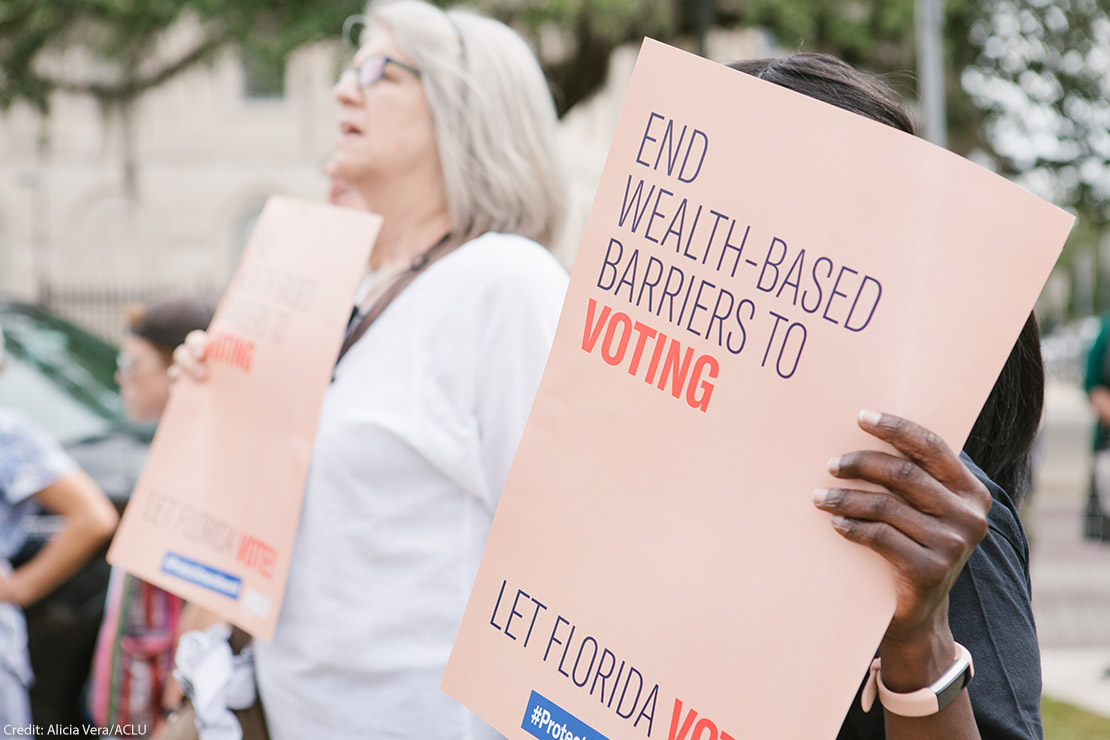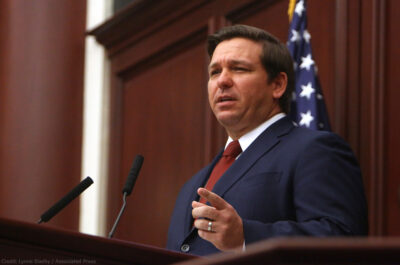
Gruver v. Barton
What's at Stake
The American Civil Liberties Union, ACLU of Florida, NAACP Legal Defense and Educational Fund, and Brennan Center for Justice at NYU Law filed a federal lawsuit challenging a new state law that creates wealth-based hurdles to voting and undermines Floridians’ overwhelming support for Amendment 4.
Summary
In June 2019, the ACLU, ACLU of Florida, NAACP Legal Defense and Educational Fund, Inc., and Brennan Center for Justice filed a federal lawsuit on behalf of several plaintiffs challenging a new state law that conditions the restoration of the right to vote after a felony conviction on a person’s ability to pay court-related fees. The lawsuit alleged violations of the First, Fourteenth, and Fifteen Amendments; the Twenty-Fourth Amendment; and the Ex Post Facto Clause.
Over five million Floridians supported Amendment 4 in the November 2018 elections. Its passage automatically restored the right to vote of 1.6 million people with past felony convictions, or nearly 25% of the 6.1 million Americans who had been permanently disenfranchised. Florida had been one of only four states who permanently disenfranchised their citizens based on a single felony conviction, causing the highest percentage of felon disenfranchisement in the country. More than 10% of Florida’s voting-age population were ineligible to vote, and of that number, over 20% were Black.
In response, the Florida Legislature quickly passed SB 7066, requiring that returning citizens pay off all court-related fees before their voting rights could be restored. The new law created two classes of returning citizens: those who are wealthy enough to pay off all court-related fees to restore their voting rights and another group who are not. This unconstitutional conditioning of the ability of a returning citizen to vote maintains the harsh racial disparities in the criminal justice system, given longstanding racial disparities in wealth and poverty.
In October 2019, a federal court granted a partial preliminary injunction in the plaintiffs’ favor. The court ruled that individual plaintiffs in the case would have their rights restored, and in doing so did not make a definitive decision on the poll-tax claim. However, the court held that “Florida cannot deny restoration of a felon’s right to vote solely because the felon does not have the financial resources to pay the other financial obligations.”
In May 2020, the district court ruled in plaintiffs’ favor, holding that disenfranchising citizens with a felony conviction who genuinely could not pay fines and fees violated the Equal Protection Clause, and that conditioning voting on the payment of fees and costs constituted a prohibited “tax” under the Twenty-Fourth Amendment. Under the district court’s ruling, those who were otherwise eligible citizens who genuinely could not pay could not be excluded from the franchise. While the district court first denied a stay pending appeal, the Eleventh Circuit granted the stay pending appeal in anticipation of an en banc hearing. Plaintiffs appealed the stay, but the Supreme Court denied the plaintiffs application to vacate. In September 2020, an en banc Eleventh Circuit reversed the judgment of the district court, holding that the challenged law did not violate equal protection nor the Twenty-Fourth Amendment.
Legal Documents
-
09/11/2020
ORDER - 11th Circuit Court of Appeals
Date Filed: 09/11/2020
Affiliate: Florida
Download Document-
08/03/2020
Appeals Court Brief - Florida voting
Date Filed: 08/03/2020
Affiliate: Florida
Download Document-
05/24/2020
Opinion - Florida
Date Filed: 05/24/2020
Affiliate: Florida
Download Document-
02/19/2020
Gruver v Barton - 11th Circuit Opinion
Date Filed: 02/19/2020
Affiliate: Florida
Download Document-
10/18/2019
ORDER
-
08/02/2019
Gruver v Barton - PI Motion
Date Filed: 08/02/2019
Affiliate: Florida
Download Document-
08/02/2019
Gruver v Barton - Expert Report of Daniel A. Smith
Date Filed: 08/02/2019
Affiliate: Florida
Download Document-
06/29/2019
COMPLAINT - Gruver v. Barton
Date Filed: 06/29/2019
Affiliate: Florida
Download DocumentPress Releases
Joint Statement on Florida Supreme Court Advisory Opinion Regarding Amendment 4
Federal Court Rules the Right to Vote in Florida Cannot Be Denied on Account of Wealth
Groups File Preliminary Injunction Motion to Block SB7066
Groups Sue to Block New Florida Law That Undermines Voting Rights Restoration
